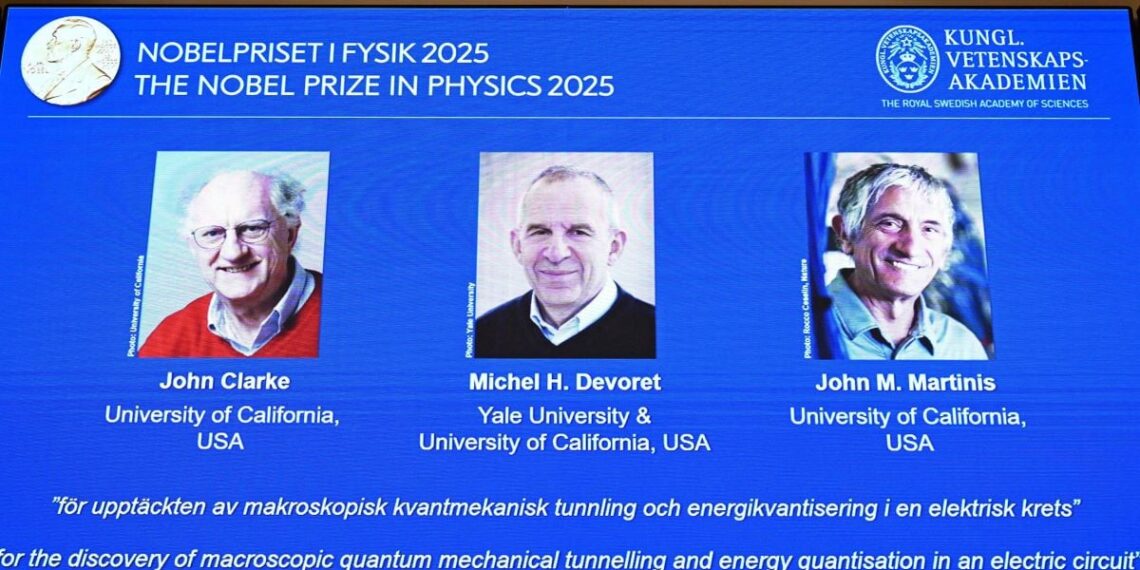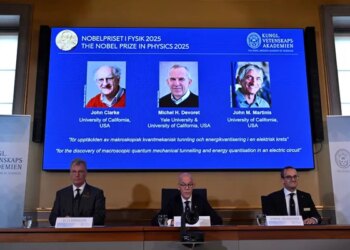Select Language:
US-based scientists John Clarke, Michel Devoret, and John Martinis received the 2025 Nobel Prize in Physics for groundbreaking experiments that demonstrated quantum physics in action, paving the way for the advancement of next-generation digital technologies.
Clarke expressed his amazement during a telephone press conference, saying, “I’m completely stunned. It never crossed my mind that this work could lead to a Nobel Prize.” He added, “I’m talking on my cell phone, which relies on this very research, and I believe that’s one of the reasons it functions so well.”
New Discoveries in the Century-Old Field of Quantum Mechanics
Quantum behavior is extensively studied at the atomic and subatomic levels, but it often appears bizarre and counterintuitive compared to classical physics at larger scales.
In the mid-1980s, the laureates conducted experiments with superconducting electronic circuits, proving that quantum mechanics can influence everyday objects under specific conditions.
Olle Eriksson, chair of the Nobel Committee for Physics, highlighted the ongoing surprises within quantum mechanics, a field more than 100 years old. “It’s incredible how quantum physics keeps revealing new facets. It’s also fundamental to all digital technology,” he said.
Quantum technology is now embedded in daily life, with transistors in computer microchips being a common example. The Nobel Committee noted that this year’s award advances the development of technologies like quantum cryptography, quantum computers, and quantum sensors.
The Promise and Challenges of Quantum Computing
Quantum computers leverage quantum mechanics principles to perform complex calculations, forecast outcomes, and analyze problems that could take traditional computers millions of years to solve.
A photograph shows Clarke, Devoret, and Martinis during the Nobel announcement, displayed on a screen at the Royal Swedish Academy of Sciences in Stockholm.
Quantum technology is seen as instrumental in addressing major global issues, like climate change. However, significant hurdles remain, including improving chip precision and establishing realistic timelines for practical, commercial quantum computing.
Connections to Google
Clarke, originally from the UK, is a professor at the University of California, Berkeley. Devoret, born in France and congratulated by French President Emmanuel Macron on X (Twitter), is a professor at Yale and UC Santa Barbara, where Martinis also teaches.
Martinis, a U.S. citizen, led Google’s Quantum Artificial Intelligence Lab until 2020. He was part of the team that achieved “quantum supremacy” in 2019, demonstrating a quantum computer solving a problem faster than the most powerful supercomputers.
Devoret serves as Google Quantum AI’s chief scientist outside of his university roles. This marks the second consecutive year that scientists with ties to Google have received Nobel honors—following the 2024 chemistry prize awarded to Google DeepMind’s Demis Hassabis and John Jumper, and the physics prize shared with Geoffrey Hinton, who previously worked for Google for over a decade.
The Nobel Prize in Physics
The Royal Swedish Academy of Sciences awards the Nobel in Physics, which includes a monetary award of 11 million Swedish kronor (about $1.2 million) split among winners. Since 1901, the prizes have recognized distinguished achievements in science, literature, and peace, starting with physics—Nobel’s original focus—due to its prominence at the time.
Notable past laureates include Albert Einstein, Erwin Schrödinger, Max Planck, and Niels Bohr, all key figures in the development of quantum theory.
Following tradition, physics is the second Nobel announced this week, after the Monday medicine award given to three scientists for immune system breakthroughs. The chemistry prize will be announced on Wednesday.
The laureates receive their awards in a ceremony at Stockholm’s City Hall on December 10, the anniversary of Nobel’s death, with a banquet afterward. The Peace Prize is awarded separately in Oslo on the following Friday.




